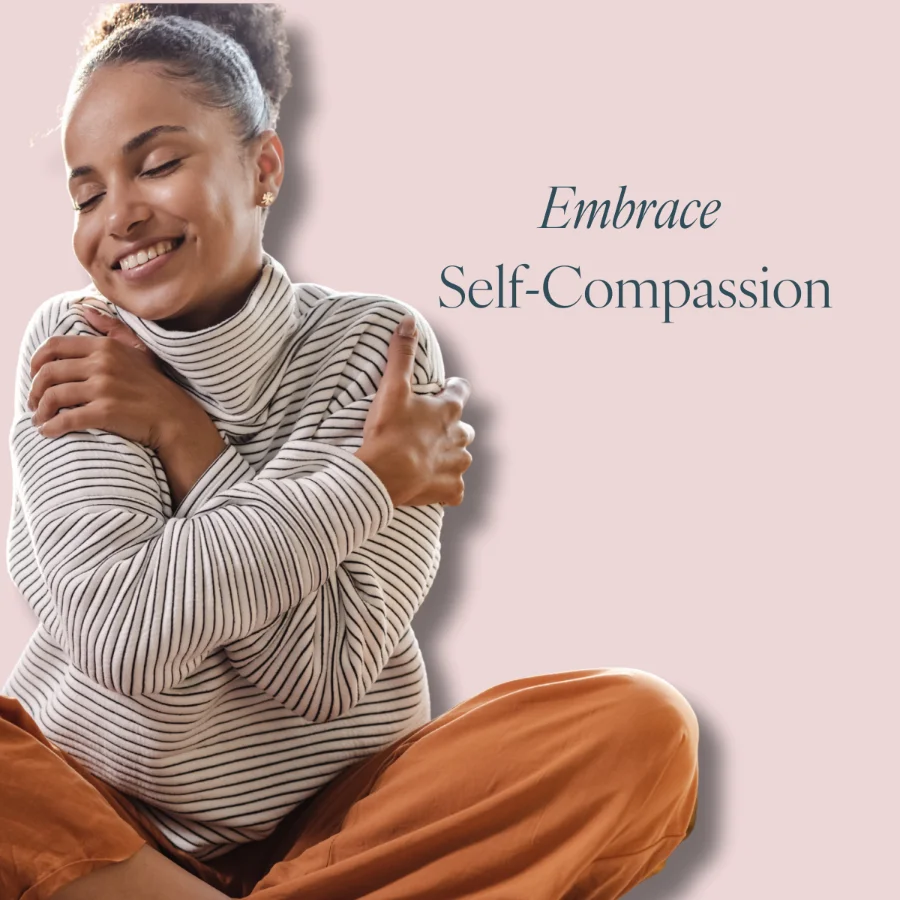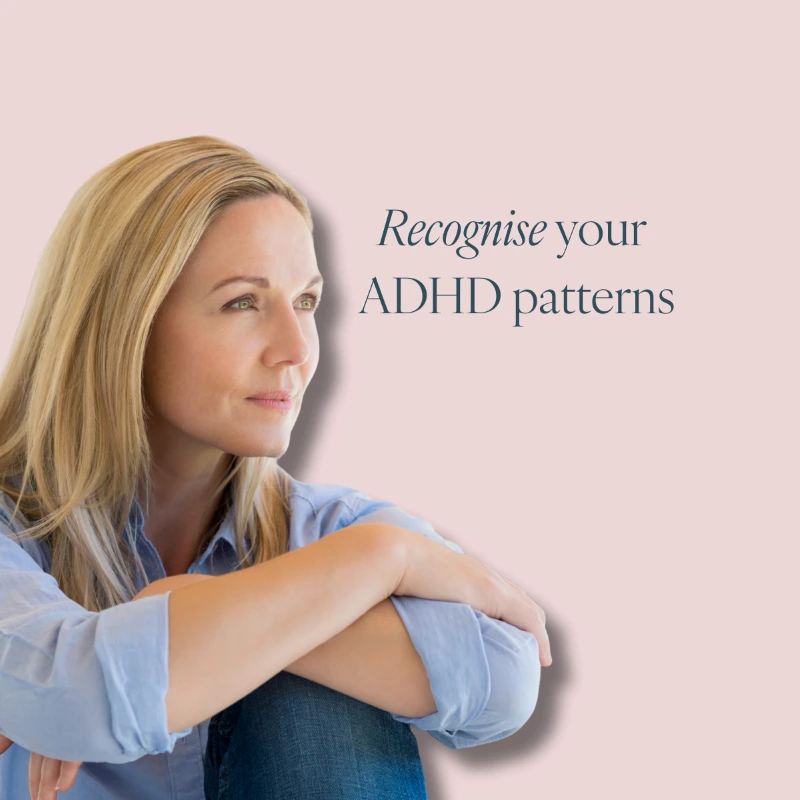Self-Compassion and ADHD: How It Can Help You Feel Better
Self-Compassion and ADHD – How It Can Help You Feel Better
If you have ADHD, one of the hardest parts isn’t always motivation, organisation, or focus.
It’s noticing your own progress.
You can do a hundred things in a day, and your brain still zooms in on the one thing you didn’t do, forgot, or didn’t finish.
And over time, that can create a quiet inner narrative of:
“I’m always behind.”
“I’m not doing enough.”
“I can’t keep up.”
If that feels familiar, you’re not alone.
Why is Self-Compassion so Hard for ADHD Brains?
If you stop and reflect for a moment, you might notice something:
It’s often much easier to spot what’s unfinished, forgotten, or didn’t go to plan than it is to recognise what you did manage.
With ADHD, your brain can naturally scan for what’s missing, what’s urgent, or what could go wrong next. It’s not because you’re doing anything wrong. It’s often because your attention has been pulled in that direction for years.
And if you’ve spent a long time being told to try harder, be more organised, or do things differently, it makes sense that self-compassion can feel awkward at first.
Sometimes it doesn’t feel comforting.
It just feels unfamiliar.
That doesn’t mean it won’t help.
It just means it might take time to feel natural.
A Lifetime of Feeling ‘Not Good Enough’
If you’ve lived with ADHD for a long time, you might carry a quiet feeling of “not quite good enough.”
Not because you haven’t tried, but because so much effort goes into coping, adapting, masking, and pushing through… and that effort often goes unseen.
Even by you.
So when self-compassion is suggested, it can feel uncomfortable at first. For some people, it feels unfamiliar rather than soothing.
That doesn’t mean it isn’t helpful. It usually just means it’s something that needs to become familiar, so it starts to feel more natural over time.
Rewiring the ADHD Brain for Self-Compassion
Self-compassion isn’t about letting yourself off the hook, making excuses, or pretending everything is fine.
It’s about learning to notice your effort, not just the outcome.
Because with ADHD, you can be trying really hard behind the scenes, even if it doesn’t always look that way on the outside.
If a friend told you they managed to get through a difficult day, reply to an important message, or keep going when they felt overwhelmed, you’d probably recognise how much that took.
You wouldn’t tell them it “doesn’t count” because they didn’t do it sooner, or because they didn’t do it perfectly.
You’d acknowledge the effort.
But when it comes to you, your brain might jump straight to what you didn’t do, what you forgot, or what you should have done differently.
Self-compassion is practising the pause that interrupts that pattern:
“Hang on… I did something today. That matters.”
And the more you practise noticing your progress, the easier it becomes to build confidence and feel more emotionally steady.
Small Steps to Start Practising Self-Compassion
You don’t need to “master” self-compassion. You can start small, and let it build naturally over time.
✅ Notice the small wins – Managed to reply to an email? Took a short break before burnout hit? Got out of bed on a tough day? These things matter. Small efforts still count..
✅ Reframe negative self-talk: Instead of saying, “I only did one thing today,” try, “I focused on the most important thing today.” That shift can make a real difference.
✅ Write it down – A notebook, notes app, or quick daily list of “things I managed” can help train your brain to notice progress rather than gaps.
✅ Say it out loud – It can feel awkward at first, but telling yourself “I’m proud of how I handled today” helps your brain absorb it in a different way.
✅ Start with neutral language – If praise feels forced, ease into it. Instead of “I did an amazing job,” try “I made an effort today and that counts.” Over time, this starts to feel more natural.

One of the biggest shifts I see
One of the biggest shifts I see is when someone starts noticing their effort, instead of only focusing on what they haven’t done.
Because if you’ve spent years feeling like you’re falling short, self-criticism can start to feel like background noise.
But when you begin practising self-compassion, something subtle (but important) starts to change.
You stop measuring yourself only by what’s unfinished.
You start recognising what you’re managing, coping with, and carrying.
And that shift can feel surprisingly relieving.
Sometimes it sounds like:
“I didn’t realise how hard I’ve actually been trying.”
“I’ve never really let myself feel proud before.”
“I thought everyone else found life easier than me.”
Those moments are quiet, but they matter.
Self-compassion doesn’t suddenly fix everything.
But it creates space.
Space for steadiness.
Space for confidence to build.
Space to feel more like you’re on your own side.
Why Self-Compassion Matters
When you practise self-compassion, you’re not lowering your standards.
You’re giving yourself a steadier foundation to build from.
It helps you notice what you are doing, not just what you haven’t done yet. And over time, that can reduce the constant pressure to prove yourself, push harder, or “catch up.”
Self-compassion doesn’t make you complacent.
It helps you feel more supported while you’re trying.
What’s Next?
If any of this feels familiar, you don’t need to change everything at once. Even small shifts in how you speak to yourself can start to make a difference.
You might begin by noticing effort rather than outcome, or by gently questioning the habit of dismissing your progress. Over time, those small moments add up.
If you’d like extra support with this, I’ve created a short self-study course on self-compassion. It’s designed to help you build a kinder inner voice, reduce self-criticism, and feel more emotionally steady, especially if you have ADHD traits and tend to be hard on yourself.
You can take it at your own pace, and come back to it whenever you need a reset.
And if you’d prefer one-to-one support, you’re welcome to get in touch. We can explore what’s coming up for you and find a way forward that feels manageable and grounded.
There’s no rush, and no right pace. This work starts exactly where you are.

If you’d like extra support with this, my self-guided course Embrace Self-Compassion explores it in more depth. It’s for anyone who finds self-kindness difficult, or not very natural yet.










